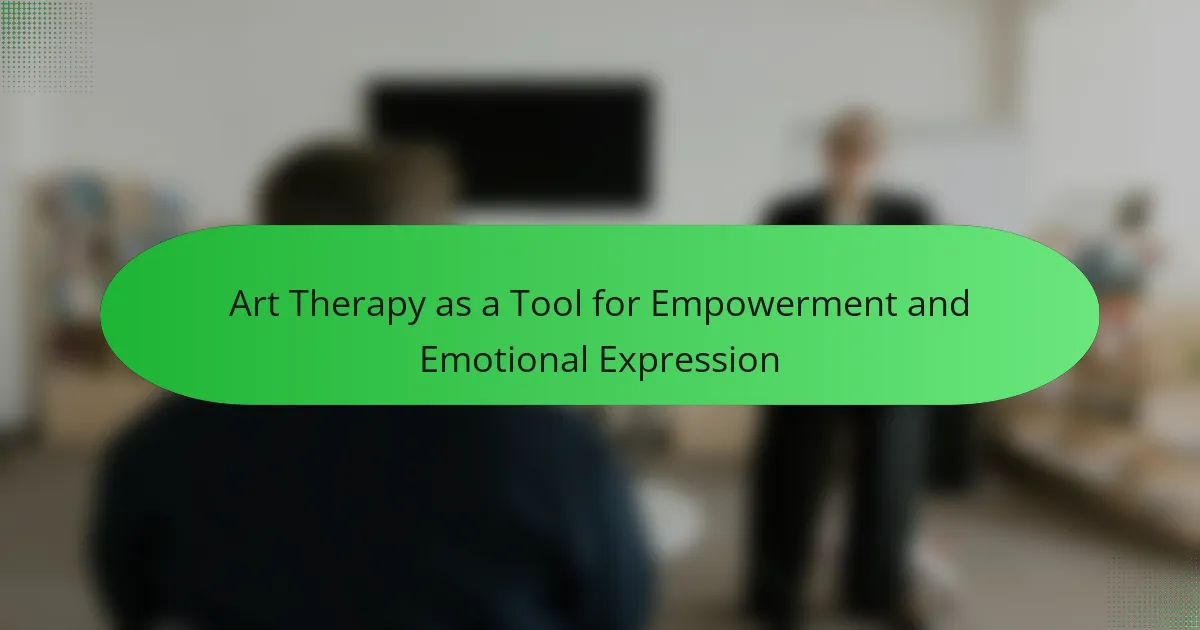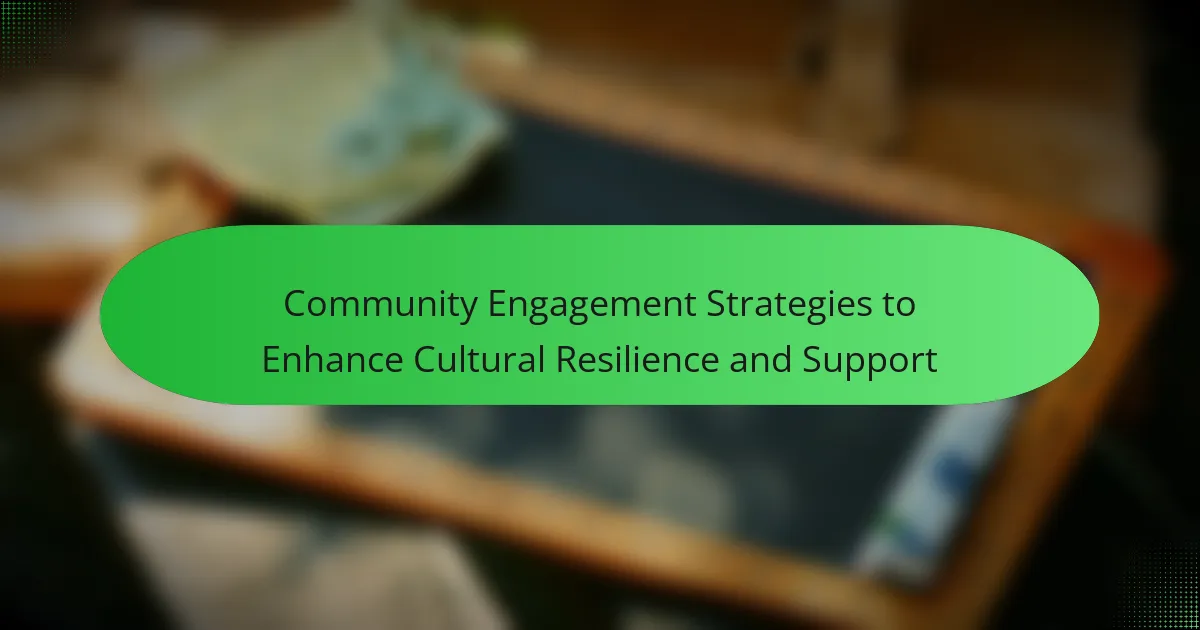Support groups play a crucial role in enhancing mental health and empowerment by fostering community and shared experiences. They provide emotional support, improve coping strategies, and help individuals gain confidence. Various types of support groups, such as peer-led and cognitive behavioral therapy groups, offer tailored approaches to address unique challenges. Overcoming barriers to participation is essential for maximizing the benefits of these groups in promoting resilience and personal growth.
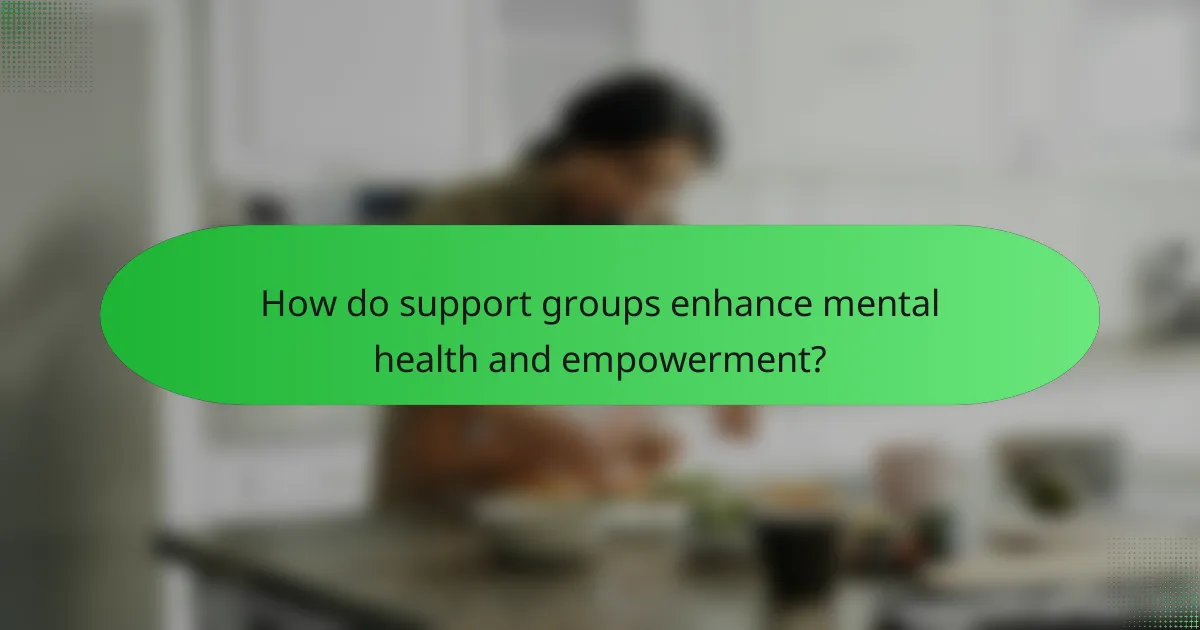
How do support groups enhance mental health and empowerment?
Support groups significantly enhance mental health and empowerment by providing a sense of community and shared experiences. They foster emotional support, reduce feelings of isolation, and improve coping strategies. Members often gain confidence through sharing their stories and receiving validation from others. This collective empowerment can lead to increased resilience and a greater sense of control over personal challenges. Studies show that participants in support groups report lower levels of anxiety and depression, highlighting their effectiveness in promoting mental well-being.
What psychological benefits do participants gain from support groups?
Participants in support groups gain numerous psychological benefits, including enhanced emotional support, improved coping strategies, and increased feelings of belonging. These groups foster a safe environment for sharing experiences, which can alleviate feelings of isolation. Participants often report greater self-awareness and personal growth through shared narratives. Additionally, the collective wisdom of the group can provide practical solutions to common challenges, reinforcing resilience and empowerment.
How do support groups foster a sense of community?
Support groups foster a sense of community by providing emotional support, shared experiences, and a safe environment for individuals. Members connect through common challenges, reducing feelings of isolation. This collective understanding enhances empathy and trust among participants. Regular meetings encourage accountability and personal growth, reinforcing the group’s bond.
What role does shared experience play in support group effectiveness?
Shared experiences significantly enhance support group effectiveness by fostering connection and understanding among members. These shared moments create a sense of belonging, which is crucial for emotional healing. Members often feel less isolated when they realize others face similar challenges, promoting empathy and validation. This collective understanding can lead to increased motivation and accountability within the group, encouraging individuals to share their stories and coping strategies. As a result, support groups become a powerful tool for mental health empowerment, leveraging the strength of community to facilitate personal growth and recovery.
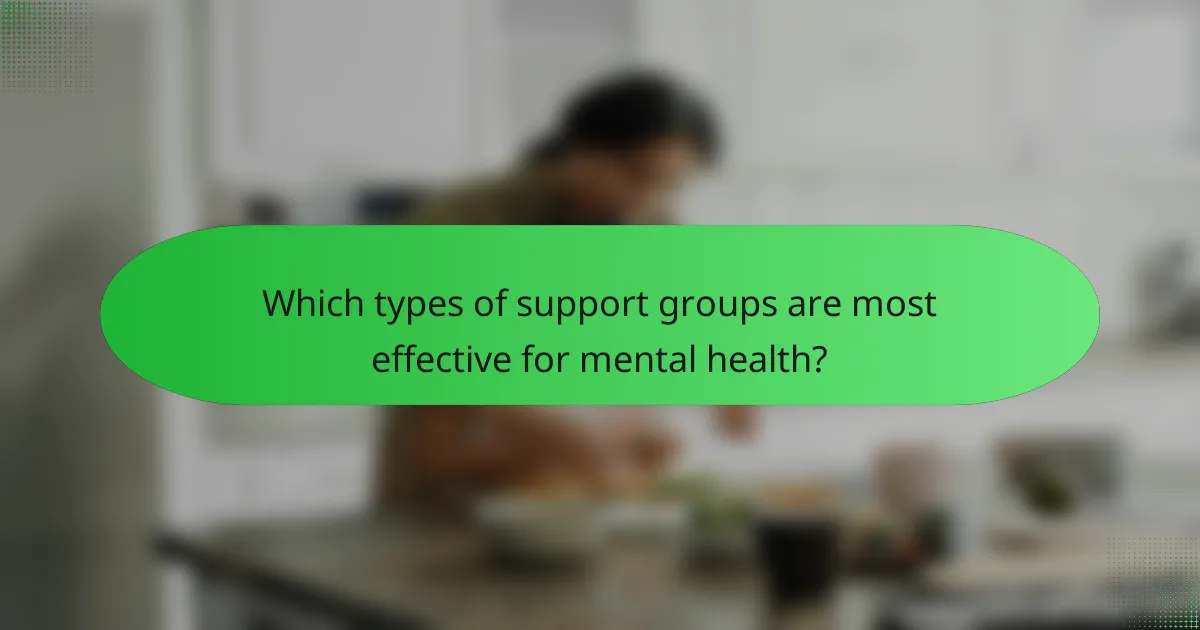
Which types of support groups are most effective for mental health?
Peer-led support groups, cognitive behavioral therapy (CBT) groups, and specialized groups for specific conditions are most effective for mental health. Peer-led groups foster shared experiences, enhancing connection and understanding. CBT groups focus on practical strategies to manage thoughts and behaviors. Specialized groups address unique challenges, providing tailored support. Each type promotes empowerment and resilience among participants.
How do peer-led groups differ from professionally-led groups?
Peer-led groups emphasize shared experiences and mutual support, while professionally-led groups focus on expert guidance and structured interventions. Peer-led groups foster empowerment through collective understanding, whereas professionally-led groups provide specialized knowledge and techniques. Both serve vital roles in mental health but differ in approach and dynamics. Peer-led environments often create a sense of belonging, while professional settings may offer tailored strategies for individual challenges.
What are the characteristics of online support groups?
Online support groups are characterized by accessibility, anonymity, community support, and diverse participation. These groups provide a platform for individuals to share experiences and gain emotional support. They often include features like real-time chat, forums, and resources for mental health education. The unique attribute of online support groups is their ability to connect people globally, allowing for a broader range of perspectives and experiences.
How do cultural factors influence support group dynamics?
Cultural factors significantly shape support group dynamics by influencing communication styles, group norms, and member expectations. For instance, cultures that prioritize collectivism may foster stronger bonds among members, enhancing emotional support. In contrast, individualistic cultures might emphasize personal responsibility, affecting how members interact and share experiences. Additionally, cultural beliefs about mental health can dictate openness to discussing issues, impacting group effectiveness. Understanding these dynamics allows support groups to tailor approaches, ensuring inclusivity and relevance for diverse participants.
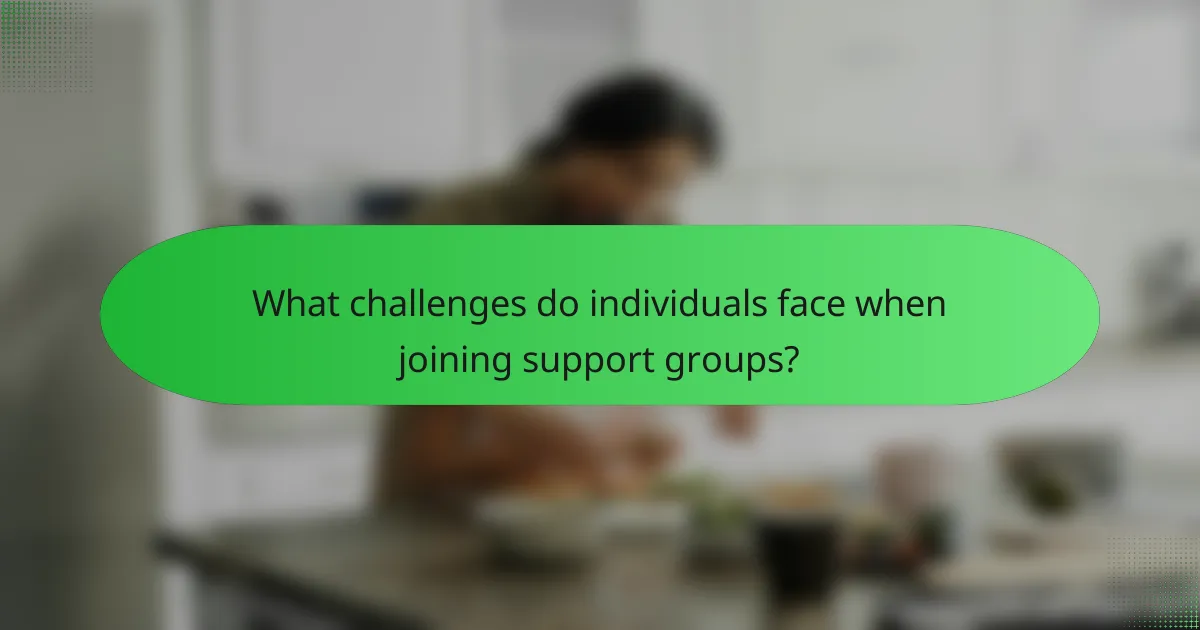
What challenges do individuals face when joining support groups?
Individuals face various challenges when joining support groups, including fear of judgment, difficulty in sharing personal experiences, and concerns about confidentiality. These barriers can hinder participation and limit the potential benefits of support groups in mental health and empowerment. Additionally, the unique attribute of group dynamics can create discomfort for newcomers, making it harder to establish connections. Overcoming these challenges often requires encouragement and understanding from existing group members.
How can stigma impact participation in support groups?
Stigma can significantly hinder participation in support groups. Individuals may fear judgment or discrimination, leading to reluctance in seeking help. This avoidance can perpetuate feelings of isolation and worsen mental health conditions. Addressing stigma through education and awareness can encourage more individuals to engage in supportive environments.
What are common barriers to accessing support groups?
Common barriers to accessing support groups include stigma, lack of awareness, and logistical challenges. Stigma can prevent individuals from seeking help due to fear of judgment. Many people may not know about available support groups, leading to missed opportunities for assistance. Logistical issues, such as transportation or scheduling conflicts, can also hinder participation. Additionally, some groups may not be inclusive, limiting access for certain populations. Addressing these barriers is essential to enhance mental health support and empowerment.
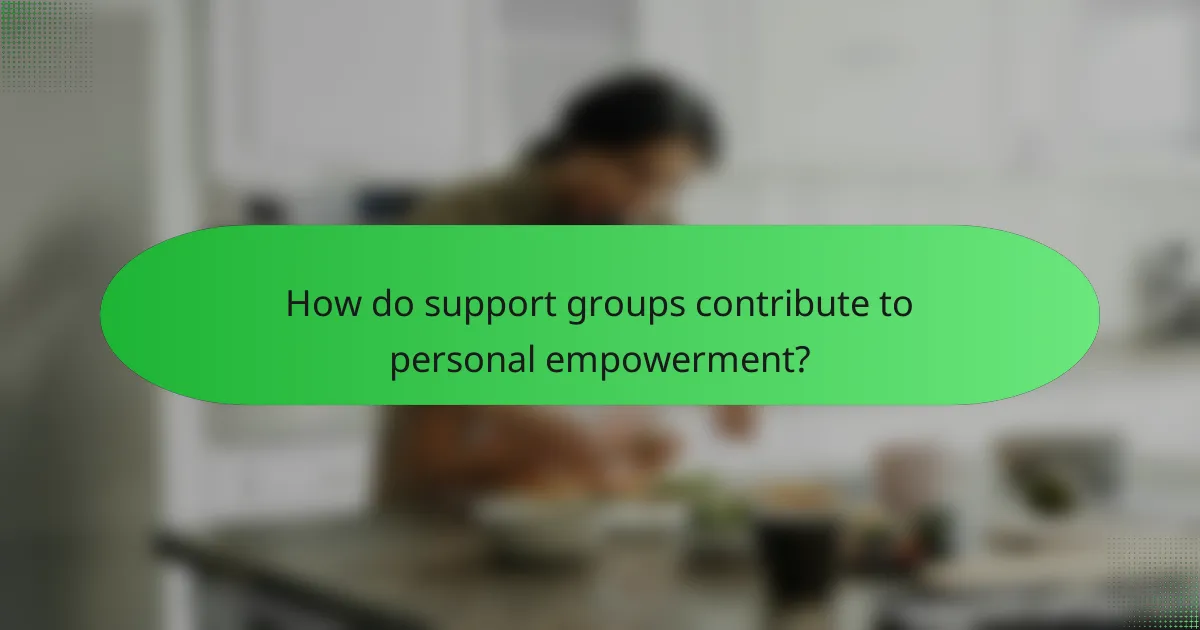
How do support groups contribute to personal empowerment?
Support groups significantly enhance personal empowerment by fostering connection, providing shared experiences, and promoting accountability. Participants often gain confidence through mutual support and understanding. This environment encourages individuals to express themselves, share coping strategies, and develop resilience. Research shows that individuals involved in support groups report higher levels of self-esteem and improved mental health outcomes. Additionally, the unique attribute of shared vulnerability creates a safe space for personal growth, enabling members to confront challenges actively.
In what ways do support groups promote self-advocacy?
Support groups promote self-advocacy by providing a safe space for individuals to share experiences, gain insights, and develop confidence in their voices. Members learn to articulate their needs and rights, fostering empowerment.
Through shared narratives, participants recognize common challenges, which helps normalize their experiences. This collective understanding encourages individuals to advocate for themselves in various contexts, such as healthcare or personal relationships.
Support groups often facilitate skill-building workshops, enhancing members’ ability to communicate effectively and assertively. These tools are crucial for self-advocacy, allowing individuals to navigate systems and express their needs clearly.
Finally, the encouragement and validation received from peers reinforce a sense of agency. As individuals witness others advocating for themselves, they are inspired to take similar actions, creating a ripple effect of empowerment within the group.
How can support groups help in developing coping strategies?
Support groups significantly aid in developing coping strategies by fostering shared experiences and emotional support. Participants learn from each other’s challenges and successes, enhancing their resilience.
These groups provide a safe environment to express feelings, reducing isolation. Members can share practical strategies that have worked for them, offering diverse perspectives on coping mechanisms.
Research indicates that individuals involved in support groups report improved mental health outcomes. They often develop stronger problem-solving skills and a greater sense of empowerment through collective wisdom.
Moreover, regular interaction in these groups can reinforce accountability, encouraging members to practice their coping strategies. This communal approach cultivates a sense of belonging, which is vital for emotional well-being.

What unique attributes differentiate successful support groups?
Successful support groups are distinguished by their sense of community, shared experiences, and effective communication. These groups foster trust and openness, allowing members to express vulnerabilities. Unique attributes include structured meetings that encourage participation and peer-led facilitation, enhancing relatability. Additionally, successful groups often establish specific goals, which help members track their progress and feel empowered.
How does group size affect the dynamics and outcomes of support groups?
Group size significantly influences the dynamics and outcomes of support groups. Smaller groups often foster deeper connections and more intimate discussions, while larger groups can provide diverse perspectives and broader support networks.
In small support groups, members may feel more comfortable sharing personal experiences, leading to increased trust and empathy. This intimacy can enhance emotional support and facilitate stronger relationships among participants. Conversely, larger support groups can offer varied insights, which may help individuals feel less isolated by exposing them to different coping strategies and experiences.
Research indicates that optimal group sizes typically range from 5 to 12 participants. This range balances the benefits of intimacy and diversity, maximizing engagement and support while minimizing potential group dynamics issues.
Ultimately, the effectiveness of a support group is shaped not only by its size but also by the group’s structure, leadership, and the specific needs of its members.
What innovative approaches are being used in modern support groups?
Modern support groups utilize innovative approaches such as technology integration, peer-led initiatives, and personalized resources. These methods enhance accessibility and engagement, promoting mental health empowerment.
Technology integration includes virtual meetings and mobile apps that connect members anytime. Peer-led initiatives provide relatable support, fostering community and trust. Personalized resources, such as tailored content and self-help tools, cater to individual needs, improving outcomes.
As a result, these innovative strategies effectively address diverse mental health challenges and empower individuals to take charge of their well-being.
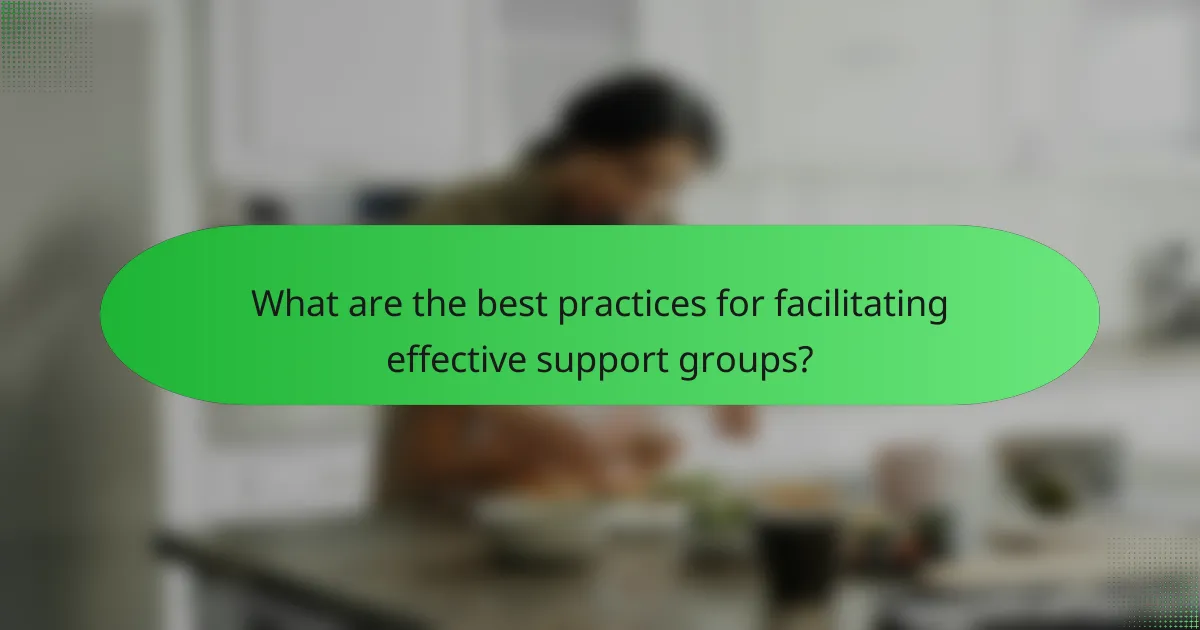
What are the best practices for facilitating effective support groups?
Effective support groups enhance mental health by fostering connection, understanding, and empowerment. Best practices include establishing clear goals, ensuring confidentiality, promoting active listening, and encouraging participation. Creating a safe space allows members to share experiences without judgment. Regularly evaluating the group’s dynamics helps maintain a supportive environment. Providing resources and professional guidance can also enhance the group’s effectiveness.
How can facilitators create a safe and inclusive environment?
Facilitators create a safe and inclusive environment by establishing trust and open communication. They encourage participation and respect diverse perspectives. Active listening and empathy are crucial in addressing concerns. Setting clear guidelines fosters a sense of safety and belonging among participants.
What strategies can enhance participant engagement and retention?
Support groups enhance participant engagement and retention through community building, structured activities, and emotional support. Fostering a sense of belonging encourages active participation. Regular meetings and goal-setting sessions provide accountability, while shared experiences create deeper connections. Research shows that participants in support groups report higher levels of empowerment and mental well-being.
What common mistakes should be avoided in support group facilitation?
Facilitators should avoid common mistakes to ensure effective support group dynamics. Key errors include dominating discussions, neglecting individual contributions, failing to establish ground rules, and not addressing conflicts promptly. These issues can hinder empowerment and mental health benefits.

